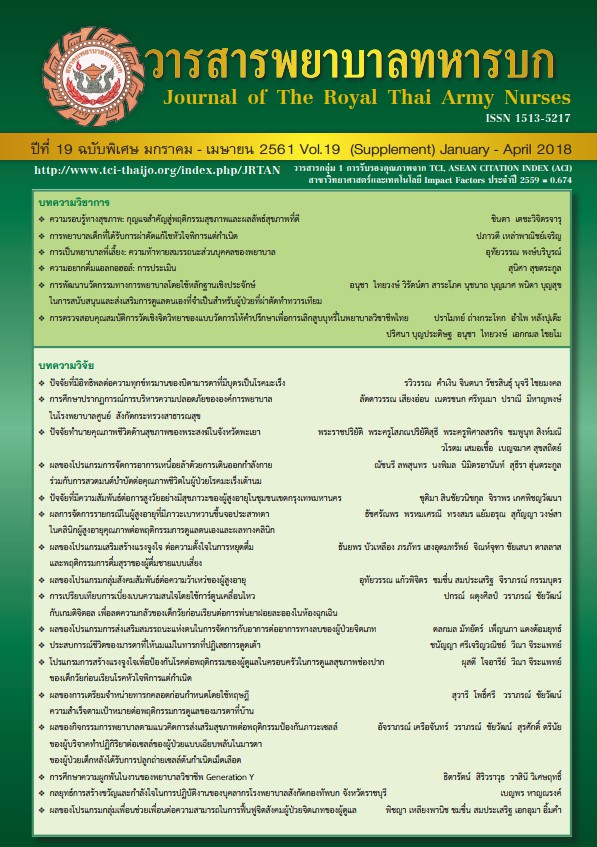The Effects of Motivational Enhancement Program on Intention to Stop Drinking and Drinking Behavior among Males with Risky Drinking
Abstract
Individuals with risky drinking behaviors whose their motivation are enhanced would have higher intention to change their behavior of reducing drinking alcoholic beverage, and may finally be able to stop drinking. The purposes of this quasi-experimental study were to test the effects of motivational enhancement program on intention to stop drinking and drinking behavior among males with risky drinking. Participants consisted of 29 males with risky drinking residing in Bor sub-district, Khlung District of Chanthaburi Province. Random assignment was employed to select 14 participants to the experimental group and 15 males to the control group. Participants in the experimental group received the motivational enhancement program for 8 sessions, 2 sessions per week for 4-week period. Each session took about 60-90 minutes. For the control group, participants received usual care from the health promotion hospital. Research instruments included a demographic questionnaire, the intention to stop drinking questionnaire, and the drinking behavior questionnaire. Their reliability were .91 and .81 , respectively. Data were analyzed by using descriptive statistics, independent t-test, and two-way repeated measure ANOVA. The results revealed that after completion of the motivational enhancement program, participants in the experimental group had higher intention to stop drinking and less drinking behavior than those in the control group (p<.001). Moreover, within the experimental group at 1 month follow-up, the participants had higher intention to stop drinking and less drinking behavior than at immediately finished the intervention (p<.05). These findings indicate that the motivational enhancement program is effective. Nurses and relevant health care personnel could obtain this program to apply with risky drinking males to increase intention to stop drinking and decrease drinking behavior. Consequently, they could stop drinking.
Downloads
References
2. Summary of the 1st Regional Alcohol Conference. (2011). Alcohol problems at the regional level. September 5, 2011 Charoen Thani Hotel
Princess Khon Kaen. (In Thai).
3. Narongsakdi, T., & S. (2007). Study on the effects of alcohol consumption. Health in the lower northern part of Thailand Nonthaburi: Alcohol Research Center. (In Thai).
4. National Statistical Office. (2557). The results of a survey on smoking and binge drinking behavior. Center for Alcohol Studies. n.d. (In Thai).
5. Eemmoi P. (2010). Alcoholic drinks first time drunk and drunk impact of alcohol consumption among youth in muang district uttaradit provincial health promotion foundation, Department of Mental Health Research Institute Health system And alcohol research center. (In Thai).
6. Summary of the 1st Regional Alcohol Conference. (2011). Alcohol problems at the regional level. September 5, 2011 Charoen Thani Hotel Princess Khon Kaen. (In Thai).
7. Soenpaisarn B. (2007). Alcohol consumption in Thailand Journal of Clinical Research, 22 (1), 7-13. (In Thai).
8. Department of Mental Health. Annual Report of the Department of Mental Health, 2007 Annual Report. Nonthaburi: Planning Division, Department of Mental Health. (In Thai).
9. Jiwputtanakul U. and Samai T. (2014). Thai Family Alcohol Consumption. Journal of The Royal Thai Army Nurses. 15(2):305-311 (In Thai).
10. Ramsiriwat S. (2014) The development of nursing practice guidelines for enhancing motivation for adjustment. Change in binge drinking behavior for alcoholics. Nursing, Mental Health and Psychiatric Nursing, Graduate School, Mahidol University. (In Thai).
11. Jaija R. (2007). The Effects of therapy based on the buddhist principles and technical integration program. Psychological study on alcohol withdrawal intention of alcoholic addicts. thesis Master of Science, Counseling Psychology, Graduate School, Chiang Mai University. (In Thai).
12. Miller, W., R. & Rollnick, S. (2010). Motivational interviewing: Preparing people for Change (2nded). New York :Guiford Press.
13. Artakit P and Kittirattanapaiboon N (2009). Practice for primary care Revised edition 2. Development plan, form and methods for treatment of persons with integrated alcohol consumption problems; sunflower Paper Limited. (In Thai).
14. Ajzen & Fishbein. (1980). Understanding Attitudes and Predicting Social Behavior. New Jersy: Prentice Hall Imc.
15. Uanakit N, Chaiwat W, and Paiboon R. (2557). And self-efficacy in self-control smoking smoking intentions of adolescents. Journal of Nursing
Science Journal Chulalongkorn University, Vol. 24 No. 2. (In Thai)
16. Kamnate N. (2009). Effectiveness of motivational therapy with a video demonstrating alcohol withdrawal symptoms in patients with delirium, confused with alcohol deprivation. Journal of the American Association for Preventive Medicine 2011, May-August Year: 1 Issue 2 Pages 129-142. (In Thai).
17. Srikosai S, Piboonsri L, Sunanta V, Khamjinda, Sakharak A and Phuopho O. (2008). Effectiveness of therapeutic intervention to reduce motivation to reduce problems. Alcoholic drinking of alcoholics who served at Suan Phung Hospital. Master of Nursing Science Thesis, Department of Mental Health
and Psychiatric Nursing, Graduate School, Chiang Mai University. (In thai).
Downloads
Published
How to Cite
Issue
Section
License
บทความหรือข้อคิดเห็นใดใดที่ปรากฏในวารสารพยาบาลทหารบกเป็นวรรณกรรมของผู้เขียน ซึ่งบรรณาธิการหรือสมาคมพยาบาลทหารบก ไม่จำเป็นต้องเห็นด้วย
บทความที่ได้รับการตีพิมพ์เป็นลิขสิทธิ์ของวารสารพยาบาลทหารบก
The ideas and opinions expressed in the Journal of The Royal Thai Army Nurses are those of the authors and not necessarily those
of the editor or Royal Thai Army Nurses Association.






